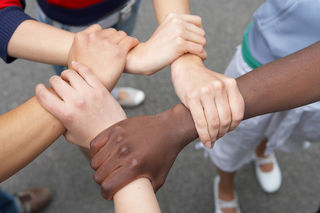OCD
What Everyone Wants
A simple technique to emphasize the powerful connection between us all
Posted March 22, 2019
A comment I hear often from clients in my therapy private practice is, “I feel so different from everyone else.” My clients typically have an anxiety disorder, OCD or a related disorder, and/or depression, and as a result, they sometimes feel disconnected from the rest of society. As a person who has OCD and BDD (body dysmorphic disorder), I completely get it. It’s hard to feel you have anything in common with other people when they seem carefree and happy and you feel anxious and alone.
I’m guessing my clients and I aren’t the only ones who feel this way. In our hyper-connected online world, many people paradoxically feel unconnected to others in their real lives. Therefore, I’m going to take a quick break from my Best TED Talks for People with OCD series for a post about a powerful little cognitive shift I employ whenever I’m feeling different from other people. And the timing of this post works well, because the tool I use is directly related to my previous blog about Brené Brown’s TED talks and the power of vulnerability to drive connection between people.

What Everyone Wants
I started using this perspective shift several years ago after reading about human connection in The NOW Effect by Elisha Goldstein, Buddha's Brain: The Practical Neuroscience of Happiness, Love, and Wisdom by Rick Hanson and Richard Mendius, and The Gifts of Imperfection: Let Go of Who You Think You're Supposed to Be and Embrace Who You Are by Brené Brown. Taking what I learned from these great books, when I’m feeling like an outsider in the world, I turn my attention away from how I’m different from everyone else and toward the opposite—three basic ways we are all the same.
Everyone Wants to Be Loved
The first commonality among all humans is that everyone wants to be loved. We humans are social animals and with good reason. From our earliest beginnings, being part of a group has been incredibly important to our survival and well-being. Just think about a caveman living by himself, without any other humans around for support and without the fur, fangs, or claws other species use for protection. That lonely caveman is not only likely to end up depressed … he’ll probably also end up as lunch for a saber-toothed tiger! Humans depend upon each other in all sorts of ways, and we are most likely to thrive as part of some type of community.
Therefore, it makes sense that belonging is a basic human need, recognized by Maslow in his hierarchy of needs. Everyone wants to be loved, whether it’s by a spouse, partner, child, parent, pet, other relative, friend, colleague, or just a kind stranger who reaches out a helping hand. Being loved or feeling like you belong is an unconscious need that goes to the core of what it means to be human.
Everyone Wants to Be Valued
The second characteristic we all have is that we want to feel valued, and this comes in two parts. First, everyone wants their innate worth as a human being to be recognized. You don’t have to do anything, achieve anything, or make anything to have value. You are valuable just because you exist. If you doubt this, look at how we treat babies—we value them just for being, not for their contributions to society.
Second, when people can contribute, they also would like others to appreciate what they do. The contributions people make don’t have to be earth-shattering. After all, not everyone can be a CEO or an Olympic athlete or a New York Times bestselling author (and I’m certainly not!). But feeling appreciated for what you do contribute is important, whether that’s keeping the city clean by collecting trash or developing the latest world-changing technological gadget or smiling at strangers when they pass by. People want to feel like they matter.
Everyone Wants to Be Happy
The third shared hallmark of being human is that everyone wants to be happy. And by that I mean to be free of suffering. We can’t be full of joy every moment of every day—that’s impossible. But everyone wants to avoid feeling bad and to make the most of their lives. In fact, in the U.S., creating happiness is so important that there’s a whole industry devoted to it! Happiness is unfortunately not a guarantee and can be quite elusive, disappearing the harder you chase it, like pigeons deftly dodging the pudgy hands of children trying to grab them in public parks. But that doesn’t make it any less of a basic human desire. We all want to be happy.
The Grocery Store Test
The easiest way I’ve found to put this test to use is when I’m standing in line at the grocery store. Looking at the person in front of me, I think to myself, “You know, that person standing right there just wants to be loved. She wants to feel valued for who she is and what she does. She wants to be happy. In so many ways, she’s just like me.”
The power of this simple change in perspective always amazes me, especially if I continue to use it throughout the day. I not only feel less isolated, less like an “other,” but also more compassionate towards everyone around me.
The Power of Vulnerability
The reason this cognitive shift can be so powerful is that by recognizing that others want to be loved, valued, and happy, we are acknowledging the vulnerabilities that we all share, vulnerabilities that make us human. As Brené says in her second TED Talk, “Vulnerability is not weakness. I define vulnerability as emotional risk, exposure, uncertainty.” Needing love, appreciation and happiness entails great emotional risk, exposure, and uncertainty, because none of those things are guarantees. When we recognize our common humanity with other people, we recognize our shared vulnerabilities. We see people more clearly for who they are under all the protective “armor” they might be projecting to the outside world: vulnerable people who need love, esteem, and contentment. People who are, in all the ways that matter, just like us.
References
Goldstein, Elisha. The Now Effect: How a Mindful Moment Can Change the Rest of Your Life. Atria Books. Kindle Edition.
Hanson, Rick. Buddha's Brain: The Practical Neuroscience of Happiness, Love, and Wisdom. New Harbinger Publications. Kindle Edition.
Brown, Brené. The Gifts of Imperfection: Let Go of Who You Think You're Supposed to Be and Embrace Who You Are. Hazelden Publishing. Nook Edition.




